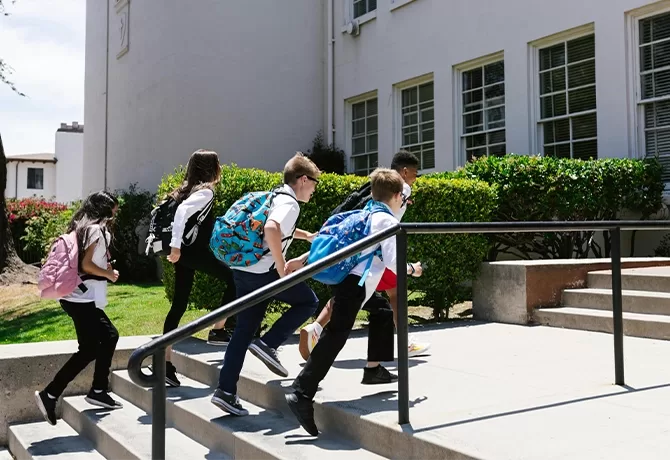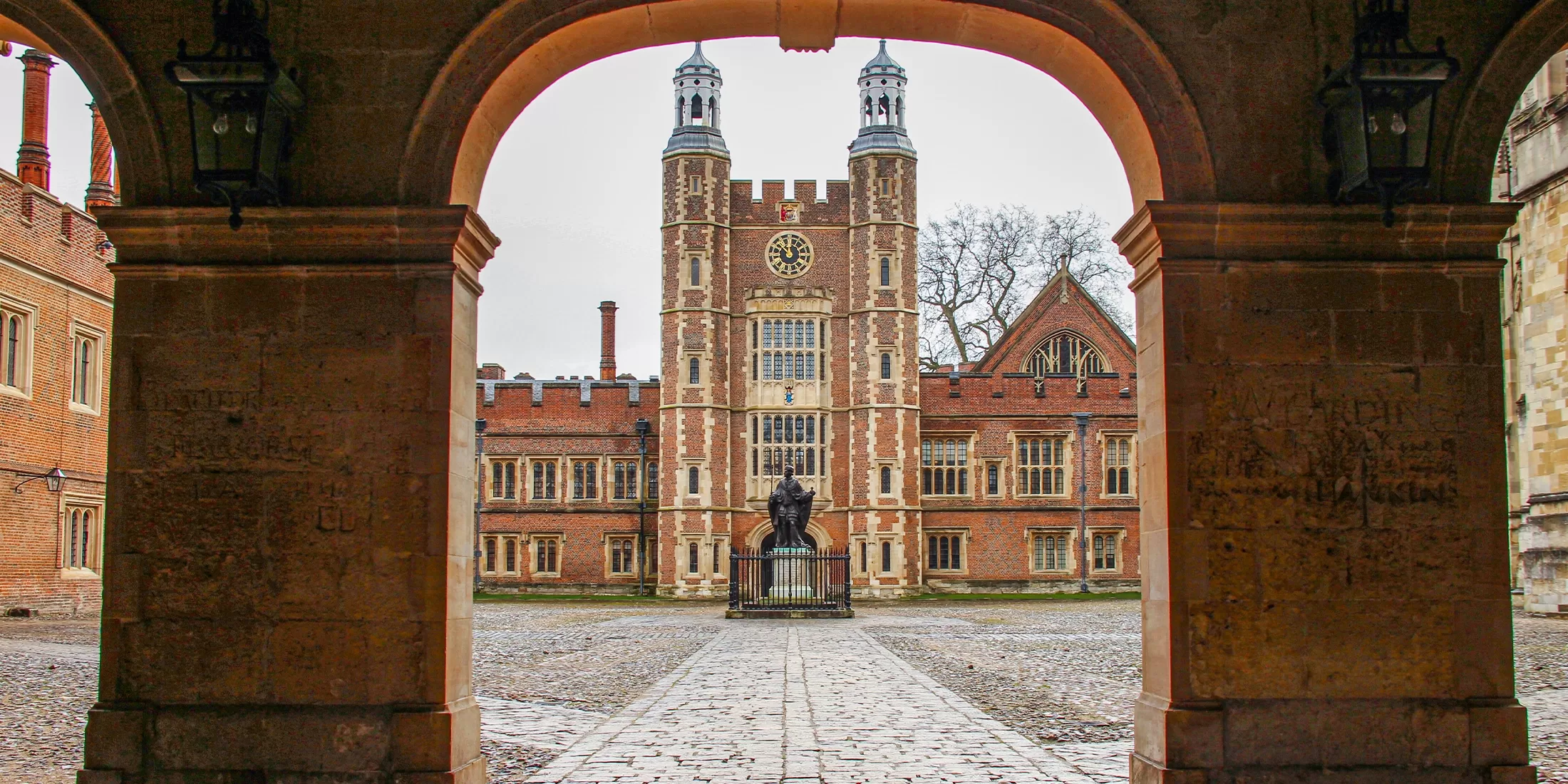Applying to UK private schools from overseas can feel overwhelming – especially if you're unfamiliar with the British education system, its terminology, and its application timelines. Whilst many UK schools are expanding globally – with satellite campuses or franchised schools opening in Nigeria, China, Malaysia, and Singapore – the appeal of a British education on UK soil remains strong. From academic excellence to a Harry Potter-inspired boarding school experience, UK private schools continue to attract families from around the globe.
Whether you're beginning your research or already preparing for entrance assessments, this guide walks you through every stage – from understanding the school system and admissions timelines to preparing your child academically and emotionally. Consider this your go-to resource for making informed and confident decisions when applying to a UK private school from abroad.
Top tip: in the UK, ‘private schools’ are often called ‘independent schools’ – and, to make things more confusing, some are also known as ‘public schools’. In this article, we use ‘private’ and ‘independent’ interchangeably.
Jump to:
Understanding the UK independent school system
An overview of UK schooling
In the UK, children are legally required to be in full-time education by the age of five. With the school year running September–September, children start in the September after their fourth birthday. The first year of formal schooling is called Reception. From there, children move through Years 1–13, with Years 12 and 13 known as Sixth Form.


Key school stages
UK school structures and stages are rooted in historic evolution. Today, schools are typically divided into junior and senior schools (with additional terminology for the private sector shown in the table below), although ‘all-through’ schools run from Reception right through to Sixth Form. The following stages typically apply in the private sector:
| School type | Ages | Year groups | Main entry point(s) | Useful information |
|---|---|---|---|---|
| Nursery | 0–4 | N/A | Rolling admissions | Nursery in the UK is not compulsory but is a popular option for childcare, early socialisation, and school readiness. |
| Pre-Prep | 4–7 | Reception–Year 2 | Reception | Pre-Prep starts with Reception (the September after a child's fourth birthday), followed by Year 1. |
| Prep School | 4 or 7–11 or 13 | Year 3–6/8 | Year 3 | Often combined with Pre-Prep, some Prep Schools end at Year 6 (age 11), mainly feeding day and all-girls' schools, whilst others continue to Year 8 (age 13), feeding co-ed and boarding schools. |
| Senior School | 11 or 13–18 | Year 6 or 8–13 (Upper Sixth) | Year 7–9 | Day and all-girls' boarding schools usually start at Year 7. Co-ed, all-boys, and boarding schools often start at Year 9. Senior Schools run through to Sixth Form (Years 12 and 13), for A-levels. |
| All-through school | 4–18 | Reception–Year 13 | Reception, Year 7, 9, or 12 | Combining all stages, all-through schools are popular with families who want to avoid multiple entrance exams. |
The key stages of UK private schools
Boarding vs day schools
One of the biggest considerations when choosing a school is whether your child will join as a day student or a boarder. Day schools (as the name suggests) don’t offer boarding; instead, children live at home and commute daily. Boarding schools provide residential provision, with children staying at school during term time.
From flexible arrangements to full-time residential life, boarding is now available in many formats, each with its own advantages and considerations:


Day school
What’s included: no boarding option available. Pupils live at home and commute in each day.
Pros: a great option for families who live locally. Children can spend time with their families and take part in social activities outside of school.
Cons: the school run can be a big pressure on parents. Additionally, Senior School is often busy with clubs, sports, etc., that day pupils don't get home until late in the evening.
Flexi boarding
What’s included: a hybrid approach where pupils can board for a couple of nights per week and can live at home on the remaining days.
Pros: it allows students to try boarding without committing to full-time residential life and offers flexibility for working parents.
Cons: the flexi-boarding arrangement can feel disruptive, with students sometimes feeling a little all over the place.




Weekly boarding
What’s included: pupils stay at school Monday morning–Saturday afternoon (typically after sports fixtures) and return home for the rest of the weekend.
Pros: this popular hybrid option gives pupils the chance to experience boarding life with regular trips home.
Cons: for students who live far away or overseas, the short turnaround of 1–2 nights at home isn’t possible.
Full boarding
What’s included: boarding in its most traditional form – pupils stay at school throughout the term, only going home at exeat weekends (usually once every half term) and during holidays.
Pros: ideal for international students and UK-based students who don’t live nearby or who want to fully embrace boarding life. Full boarding allows students to be part of a close-knit community and to make the most of everything the school has to offer.
Cons: it’s a big commitment for students and parents to be away from home for extended periods, with some students potentially experiencing homesickness.


Top tip: if you’re applying from overseas and seeking a full, traditional boarding experience, take note of the percentage of pupils who are full boarders at each prospective school. It can be challenging for full-time boarders when numbers are small, as only a handful of children remain at school over weekends when others go home.
Single-sex vs co-educational
This ultimately comes down to personal preference, and there are many arguments for and against both single-sex or co-educational schooling. Generally, single-sex private schools are more common in London, and many of the top academic achieving schools are single-sex (for example, St Paul’s, City of London, etc.).
However, there is a growing shift towards co-education, with some of the UK’s best-known single-sex schools recently announcing transitions to co-education – such as King’s Wimbledon and Winchester. We’re watching closely to see if this trend continues and if other schools follow suit.
Why families choose UK private schools
Prestige and reputation
The UK is home to some of the world's oldest and most prestigious schools. From Eton College (founded in 1440) to Wycombe Abbey, UK independent schools are world-renowned and attract students from all corners of the globe.
Academic rigour and results
Not only are British schools globally recognised, but so is the curriculum. GCSEs and A-levels are highly respected qualifications around the world, and many schools now also offer the ever-popular IB Diploma during the final two years. Many UK independent schools – particularly those that are academically selective on entry – are known for their academic rigour and excellent results. For example, in 2024, St Paul’s boys achieved 90% A*–A grades at A-level.
Pathways to top universities
Independent schools have a strong track record of success, with many students going on to study at world-renowned universities. Take Sevenoaks, for example: in 2024, 23 students gained places at Oxbridge, and 45 students gained places at Ivy League universities in the US. These schools place a strong emphasis on supporting students with further-education applications and guiding them through the process. The results speak for themselves.
Boarding school experience
The UK is well known for its traditional boarding school experience, which is rarely found elsewhere in the world. With around 500 boarding schools across the UK, there are plenty of options to choose from. For many international students, the charm of studying in historic settings – often reminiscent of the Harry Potter world – adds to the unique appeal of a British boarding school education.
Broader extracurricular and character development
Schools place a significant emphasis on extracurricular opportunities and character development. From once-in-a-lifetime trips to The Duke of Edinburgh’s Award, CCF, and community-action programmes, to after-school clubs and societies – the breadth of what’s on offer is unrivalled, and there truly is something for everyone.
Key entry points and the admissions process
Understanding when and how to apply is key to navigating the UK independent school system. Below, we outline the main entry points – from 4+ through to Sixth Form – along with the key dates, assessments, and processes at each stage.
| The admissions timeline | |||||
|---|---|---|---|---|---|
| Ages | |||||
| 4+ | 7+ | 11+ | 13+ | 16+ | |
| What it means | Entry to Nurseries, Pre-Preps, or Prep Schools start at age four. | First formal assessment point for selective Prep Schools or some all-through schools. | Main entry point for most independent senior day schools and girls' boarding schools. | Main entry point for most co-ed and boys' boarding schools; smaller intake for girls' boarding/day schools. | Entry into Sixth Form (Years 12–13). |
| Registration deadline | Varies by school – early registration is encouraged. | Sept–Oct of Year 2 (one year prior). | June of Year 5–October of Year 6 (one year prior). | June of Year 5–October of Year 6 (three years prior). | Oct–Nov of Year 11 (one year prior). |
| Type of assessment | Some selective schools require a 4+ assessment, many are non-selective but require timely registration. | English, Maths, and Reasoning. | Stage 1: ISEB Pre-test. Stage 2: School's own assessments in English, Maths & Reasoning, plus interviews/group activities. | Stage 1: ISEB Pre-test. Stage 2: school assessments in English, Maths and Reasoning, including interviews and group activities. | School assessments in chosen A-level subjects (or strongest subjects if undecided) and an interview. |
| When assessment takes place | Varies by school. | October of Year 2 (one year prior). | Pre-test: Oct–Nov of Year 6. Stage 2: Jan–Feb of Year 6. | Pre-test: Oct–Nov of Year 6 (three years prior). Stage 2: Jan–Feb of Year 6 (three years prior). | Nov–Dec of Year 11 (one year prior). |
| When offers are made | Varies by school. | Shortly after assessments, before Christmas of Year 2. | March of Year 6 (one year prior). | March of Year 6 (three years prior). | Before Christmas break of Year 11 (one year prior). |
| Additional information | Places fill quickly. Selective 4+ is less common, but early engagement is essential. | Seen as a route to avoid 11+ when available at all-through schools, but very competitive. Notable schools using the 7+ across London include Highgate, St Paul's Juniors, King's Wimbledon, and Westminster Under. | Stage 1 pre-test results are shared with all applied schools across 11+ and 13+. The pre-test covers English, Maths, and Verbal and Non-Verbal Reasoning. | Some schools offer late entry via assessment in Year 7 (e.g., Sevenoaks, Uppingham, Stowe, and Oundle), (two years prior). | Intake varies: e.g., Wellington College takes 65 new pupils into the Sixth Form, whereas Bradfield College only accepts around 25). |
The key entry points and admissions timelines for UK private schools
Top tip: each school has its own admissions process, and timelines can vary. To avoid missing deadlines, families should check the requirements for every school they are considering.
Interviews: format and what to expect
Interviews are usually one-to-one, though some schools hold group interviews. During the interview, schools are looking for bright, engaged, curious children who can converse confidently with an adult and speak about themselves – their hobbies, interests, current affairs, and reasons for wanting to join the school.
Questions can range from standard introductions to abstract or reasoning-based prompts. Here are some examples from this year’s cohort:
Tell me a bit about yourself.
What makes you laugh?
How would your friends describe you?
What do you love most about your current school?
What excites you most about joining this school?
What do you like to do in your spare time?
Are you involved in any charity or community work?
If you were prime minister for a day, what would you do?
What have you read in the news this week that you feel strongly about?
Describe the colour yellow.
If you could create a new school rule, what would it be?
Interviewers are never trying to catch children out. Questions are designed to get them talking and to help the interviewer to get to know the child and how they think. Keeping up to date with current affairs, researching or visiting the prospective Senior School, and reflecting on strengths, weaknesses, achievements, and interests are all great ways for children to prepare.
Top tip: interviews are age-appropriate, so it’s worth noting that 16+ interviews will be more academically focused and pitched at a higher level.
Remote vs in-person options for international applicants
Senior Schools understand that travelling to the UK can be a time-consuming and costly exercise for families. For assessments, schools often offer international students the option to take them remotely.
Whilst this is a convenient option for those unable to travel, we encourage parents to have their children attend assessment days and interviews in person where possible. This allows students to:
Have the full experience: it’s often easier to connect with someone in person rather than online.
Become familiar with life in the UK.
Visit the school: they don’t always look or feel the same in person versus online.
That said, there is no disadvantage from the school’s perspective in completing the process remotely. Whilst schools appreciate families making the effort to visit, they will not discriminate against those who are unable to.


Entry requirements for top UK private schools
Competitiveness
Admissions processes and entry requirements vary across schools, and a more oversubscribed or ‘harder to get into’ school doesn’t automatically make it a ‘better’ fit. Every child is different, so it’s crucial to focus on finding the right school for the individual. What suits one child may not suit another.
That said, it’s worth understanding the competitive nature of some of the UK’s highest performing or regarded schools. For example, Eton College, arguably the UK’s most well-known independent school, typically receives over 1,300 applications for around 250 places. Competition is intense, so families should make informed choices and consider applying to a range of schools.
Head teacher reports
A confidential reference from the student’s current school forms an important part of the application. All Prep and Senior Schools will request a written reference from the head of the applicant’s current school. This is considered alongside assessment and interview results. Families should ensure their current school is aware of their plans to apply to UK schools.
English language expectations
Schools offer varying levels of English as a Foreign Language (EFL) support. Some schools accept students with a lower level of English, while academically selective Senior Schools typically require students to reach at least B1 level. Less academically selective schools or Prep Schools may admit students with lower English proficiency if they believe the child can adequately access the curriculum.
Top tip: for Senior School students who need extra support, some schools, such as Roedean, offer a foundation year focused predominantly on English Language before students continue with the rest of their studies.
How to support your child through the process
Academic preparation and tutoring (when and what to focus on)
We believe that private tuition should be purposeful – not just for the sake of it. A ‘little and often’ approach is a far more effective than last-minute cramming, and it’s never too early to start. Every child is different, so the amount and type of preparation required will vary. An independent academic assessment at the start of the process is crucial to determine the best approach.
Interview preparation
Children should feel confident and understand what to expect in interviews – but without sounding over-rehearsed. Schools value authenticity and can easily spot scripted answers, so it’s best to avoid them. The key is balance: children should stay informed about current affairs, research their prospective schools, and feel comfortable talking about themselves and their interests. Family mealtimes are great for informal practice.
Top tip: we recommend at least one mock interview with someone unfamiliar to simulate a real interview experience.
Ways to ease the transition
Moving to the UK can be a major adjustment, especially for children from non-English-speaking backgrounds. Differences in language, customs, uniforms, even food can feel unfamiliar. Residential holiday camps offer a fun, low-pressure way to experience UK school life and ease the transition. Strong English language skills are essential, so prioritise language support early. A private tutor can provide personalised guidance and help ensure steady progress.
Making a mid-year move?
Is it possible?
In short, yes. UK schools are experienced in supporting international families and understand that life doesn’t always align with school admissions timelines.
However, families should be aware that seeking an ‘occasional place’ (a place outside a school’s main entry points) may come with more limited options. As such, it’s important to remain flexible about which schools to consider:
Availability and space: this is particularly relevant for boarding schools, where places may be limited.
Year group: younger children (Reception–Year 5) generally adapt easily, whilst mid-year moves during exam years can be more complicated.
Curriculum: families should be aware of differences between their child’s current curriculum and the British curriculum. Catch-up work, often supported by a tutor, may be needed to ease the transition.
It’s important to remember there is always a solution, and we’re here to help families navigate these choices strategically to find the best fit for their child.
How to approach schools
Honesty is always the best policy. Parents should be transparent about the reasons for a mid-year move – schools appreciate this and are usually more willing to assist. Support from an experienced education consultant can be invaluable in navigating school communications, as first impressions matter.
Things to be mindful of
Parents should consider both the social and academic impact of a mid-year move. Whilst children are often highly resilient and can thrive in a new environment, it’s important to weigh all factors carefully to ensure the move is the right choice for your child.


Common mistakes to avoid
Applying too late
Deadlines matter. For example, Latymer Upper typically receives over 1,000 applications for just 125 places at 11+, and many schools cannot offer flexibility. Whilst schools try to accommodate international students who may be unfamiliar with the UK independent school system’s early application model, we strongly recommend starting the process early.
For 11+ and 13+ entry, families should be exploring schools during the UK equivalent of Year 5.
For 16+ entry, the admissions process is more condensed, and deadlines remain firm, especially at competitive and oversubscribed schools.
Underestimating the competition
Academically selective independent schools, particularly Senior Schools, are very competitive, and preparation is crucial.
In UK Prep Schools, children are intensively prepared for Senior School admissions tests, and international students should follow a similar approach to maximise their chances of success.
Over-relying on rankings
It’s common to focus heavily on a school’s rankings, academic results, and exit outcomes. Whilst these are important, we encourage parents to also consider a school’s value add. For example, St Paul’s School achieves some of the top exam results in the country, with 90% of all A-level grades at A*/A. However, it's also extremely selective, admitting only the highest-performing students at 11+, 13+, and 16+.
Not visiting (even virtually)
Choosing a school is like buying a house – what looks great on paper may not feel right in practice. Visiting schools, speaking with current students, observing staff-student interactions, and experiencing boarding houses are all vital. This will be your child’s home away from home, so we strongly encourage families to visit a handful of schools whenever possible.
Ignoring school ‘fit’ for the child
Finding the right environment for your child is essential – happy children are successful children. There is no one ‘best school’; what works for one child may not suit another. Taking the time to explore options thoroughly and prioritising the right fit leads to a far more successful outcome.
Why the right support makes all the difference
Choosing and applying to a UK private school from abroad is a significant undertaking, but with the right support, it can be a smooth and rewarding journey. Whilst this guide provides a thorough overview, nothing can replace personalised advice tailored to your child’s needs.
Every child is different, and finding the right school is about more than rankings or reputation – it’s about identifying the environment where your child will thrive. That’s why we encourage families to start planning early, seek expert guidance when needed, and maintain open conversations with schools.
Whether you're considering a mid-year move or preparing for a future entry point, thoughtful preparation and a clear understanding of the process make all the difference. It’s never too soon to get started.
For personalised guidance and to plan with confidence, contact Quintessentially Education at [email protected] or call +44 (0)20 3073 6839.

















